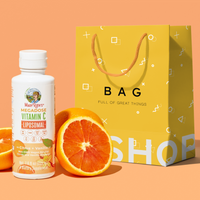
FEATURED
BY COLLECTION
FIND MARYRUTH'S IN STORE!

STORE LOCATOR
Now you can find your all-time faves and discover some exciting new products while you're out shopping.
GET STARTEDYou’ve probably heard about needing calcium when growing up to have strong bones, but did you know that there are other nutrients that help with your bone health and calcium absorption? Vitamin D is important for many bodily processes, but here we are going to focus on the relationship between calcium and vitamin D, and why you should take these nutrients together.
Vitamin D is a fat-soluble vitamin that your body can produce on its own with help from the sun, as well as get from food or supplements. Fat-soluble vitamins like vitamin D are naturally produced by your body on its own and can stay in your body for longer periods of time than water-soluble vitamins. Other fat-soluble vitamins include vitamin A, vitamin E, and vitamin K.
Calcium is a mineral. That means it’s an inorganic substance, a substance that is not produced by plants, animals, or humans. Minerals are absorbed by plants from water and soil. After absorption, minerals can then enter the bodies of the animals who eat plants, as well as the people who eat plants and animals. You get minerals from food, but you can also take them as supplements.
Calcium’s primary role in your body is helping you maintain strong bones, though, it is also needed to carry out many other important functions like movement of your muscles and helping your nerves deliver messages between your brain and the rest of your body. Calcium helps your blood vessels to move your blood, as well as release hormones and enzymes needed by your body. You can get calcium from a number of dietary sources, but the most well-known calcium-rich food is dairy. If you are eating a plant-based diet, dairy isn’t an option, so it may be helpful to take a calcium supplement or add more vegan sources of the mineral to your daily meals.
>> SHOP OUR K2 + D3 CALCIUM GUMMIES
Lack of sufficient calcium in your diet may cause multiple problems. If you are noticing any of the symptoms listed below, make sure to talk to your doctor. A healthcare professional can check your micronutrient levels to see if a calcium deficiency is causing problems for your health.
If you start noticing symptoms of a calcium deficiency, your doctor may recommend that you start taking a vitamin D supplement. As you now know, your body’s absorption of calcium is dependent on vitamin D. For this reason, adding a calcium supplement to your diet may not be enough to help with calcium deficiency. If your body is low on vitamin D, you may need to first treat this deficiency before your body can properly absorb and use calcium again.
To support all of your nutrient needs, it’s a great idea to pair a high-quality multivitamin with a nutrient-dense diet. Food should be your go-to source for the nutrients that your body needs, but supplements can be a big help as well. Taking our liquid multivitamin in the morning and multimineral at night will give you calcium, vitamin D, and many other nutrients that you need, all in one place. Adding a multivitamin to a diet that is already full of nutrients may help you avoid a deficiency and support your overall health.
Pairing MaryRuth’s liquid multimineral with your liquid daily multivitamin is a great way to support your body with calcium and vitamin D3, as well as many more essential nutrients. Our signature formulas are easy to take, making it a great option for kids and adults alike. It’s also made without any added sugar, so you can feel great about including it in a healthy diet and sharing it with your family.
To use our liquid multivitamin and multimineral, simply start your day with one and end your day with the other! It’s as simple as that. Our multivitamin is designed to be taken first thing in the morning to give you the energy and nourishment that you need to take on your day. Then, finish the day out with a serving of our liquid multimineral to provide your body with calcium, vitamin D3, and a wide array of other essential nutrients.
You can find our liquid multivitamin here and our multimineral here. This pair is the perfect combination – they taste fantastic, are full of high-quality ingredients, and are right at home in a vegan diet! Additionally, our K2 + D3 Calcium Gummies provide three important nutrients for your bone and joint health all in one.
Health education made easy!
your shopping bag